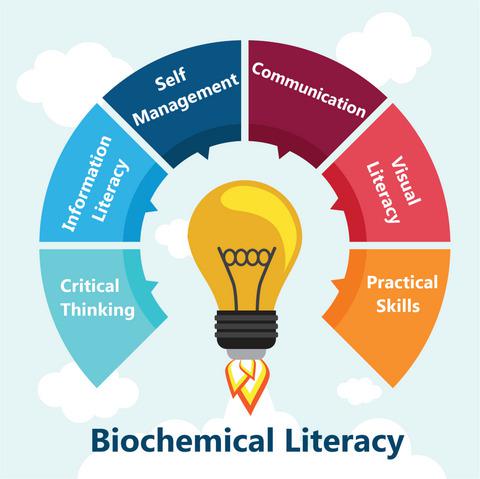当前位置:
X-MOL 学术
›
FEBS Open Bio
›
论文详情
Our official English website, www.x-mol.net, welcomes your
feedback! (Note: you will need to create a separate account there.)
The Biochemical Literacy Framework: Inviting pedagogical innovation in higher education.
FEBS Open Bio ( IF 2.8 ) Pub Date : 2020-08-18 , DOI: 10.1002/2211-5463.12938 Danielle L Evans 1 , Sarah G Bailey 1 , Alfred E Thumser 1 , Sarah L Trinder 1 , Naomi E Winstone 2 , Ian G Bailey 1
FEBS Open Bio ( IF 2.8 ) Pub Date : 2020-08-18 , DOI: 10.1002/2211-5463.12938 Danielle L Evans 1 , Sarah G Bailey 1 , Alfred E Thumser 1 , Sarah L Trinder 1 , Naomi E Winstone 2 , Ian G Bailey 1
Affiliation

|
When developing meaningful curricula, institutions must engage with the desired disciplinary attributes of their graduates. Successfully employed in several areas, including psychology and chemistry, disciplinary literacies provide structure for the development of core competencies‐pursuing progressive education. To this end, we have sought to develop a comprehensive blueprint of a graduate biochemist, providing detailed insight into the development of skills in the context of disciplinary knowledge. The Biochemical Literacy Framework (BCLF) aspires to encourage innovative course design in both the biochemical field and beyond through stimulating discussion among individuals developing undergraduate biochemistry degree courses based on pedagogical best practice. Here, we examine the concept of biochemical literacy aiming to start answering the question: What must individuals do and know to approach and transform ideas in the context of the biochemical sciences? The BCLF began with the guidance published by relevant learned societies – including the Royal Society of Biology, the Biochemical Society, the American Society for Biochemistry and Molecular Biology and the Quality Assurance Agency, before considering relevant pedagogical literature. We propose that biochemical literacy is comprised of seven key skills: critical thinking, self‐management, communication, information literacy, visual literacy, practical skills and content knowledge. Together, these form a dynamic, highly interconnected and interrelated meta‐literacy supporting the use of evidence‐based, robust learning techniques. The BCLF is intended to form the foundation for discussion between colleagues, in addition to forming the groundwork for both pragmatic and exploratory future studies into facilitating and further defining biochemical literacy.
中文翻译:

生化素养框架:促进高等教育的教学创新。
在开发有意义的课程时,院校必须考虑毕业生所需的学科属性。学科素养成功应用于心理学和化学等多个领域,为追求进步教育的核心能力的发展提供了结构。为此,我们寻求制定研究生生物化学家的全面蓝图,提供对学科知识背景下技能发展的详细见解。生物化学素养框架 (BCLF) 旨在通过激发基于教学最佳实践开发本科生物化学学位课程的个人之间的讨论,鼓励生物化学领域及其他领域的创新课程设计。在这里,我们研究生化素养的概念,旨在开始回答这个问题:在生化科学的背景下,个人必须做什么和知道什么才能接近和转变思想? BCLF 首先参考相关学术团体(包括英国皇家生物学会、生化学会、美国生物化学和分子生物学会以及质量保证局)发布的指导,然后再考虑相关的教学文献。我们提出生化素养由七项关键技能组成:批判性思维、自我管理、沟通、信息素养、视觉素养、实践技能和内容知识。这些共同形成了一种动态的、高度互连和相互关联的元素养,支持使用基于证据的、强大的学习技术。 BCLF 旨在为同事之间的讨论奠定基础,并为促进和进一步定义生化素养的务实和探索性未来研究奠定基础。
更新日期:2020-08-18
中文翻译:

生化素养框架:促进高等教育的教学创新。
在开发有意义的课程时,院校必须考虑毕业生所需的学科属性。学科素养成功应用于心理学和化学等多个领域,为追求进步教育的核心能力的发展提供了结构。为此,我们寻求制定研究生生物化学家的全面蓝图,提供对学科知识背景下技能发展的详细见解。生物化学素养框架 (BCLF) 旨在通过激发基于教学最佳实践开发本科生物化学学位课程的个人之间的讨论,鼓励生物化学领域及其他领域的创新课程设计。在这里,我们研究生化素养的概念,旨在开始回答这个问题:在生化科学的背景下,个人必须做什么和知道什么才能接近和转变思想? BCLF 首先参考相关学术团体(包括英国皇家生物学会、生化学会、美国生物化学和分子生物学会以及质量保证局)发布的指导,然后再考虑相关的教学文献。我们提出生化素养由七项关键技能组成:批判性思维、自我管理、沟通、信息素养、视觉素养、实践技能和内容知识。这些共同形成了一种动态的、高度互连和相互关联的元素养,支持使用基于证据的、强大的学习技术。 BCLF 旨在为同事之间的讨论奠定基础,并为促进和进一步定义生化素养的务实和探索性未来研究奠定基础。










































 京公网安备 11010802027423号
京公网安备 11010802027423号